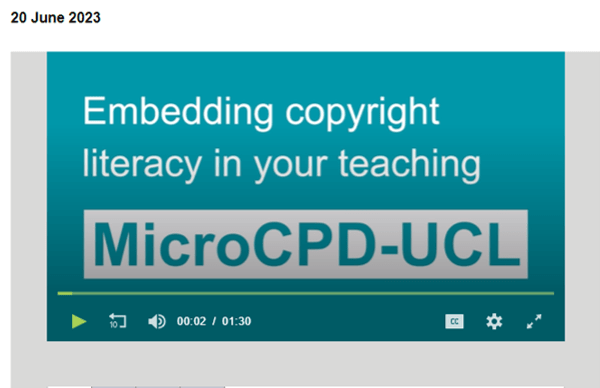Five ways to engage with copyright at UCL
By Christina Daouti, on 18 June 2025
This post brings together five key resources and activities you can engage with to learn more about copyright and share your copyright questions and knowledge with others.

Photo by Otto Rascon, Pexels.
Online tutorials. Is copyright the Father of creativity? The UCL Copyright Essentials online tutorial covers the basics of copyright protection, permissions, exceptions and open access materials. It is suitable for students and staff who are new to copyright or want to refresh their knowledge (and hear a little bit about Star Wars). The Copyright and your Teaching tutorial offers practical advice on using materials in teaching and explores exceptions using a work of art as an example. A third tutorial aimed at researchers will be available in the new term.
Website. The UCL copyright website includes introductory and specialised guidance for students and staff, including information related to theses, research publications, research data, and a guide on AI.
Live sessions. Copyright sessions are held online (over Teams) or in person. Topics include copyright for postgraduate research, copyright for publications and research data, the use of images, and publishing agreements. Sessions on specific topics can also be arranged on demand. View the current programme (with new sessions to be available from September) or contact copyright@ucl.ac.uk to arrange a bespoke session.

Image designed by Christine Daoutis using icons from Open Clipart.
Copyright games. Learn and engage with tricky copyright questions by playing a game. The Copyright for Humans card game (developed at UCL) encourages discussion of various copyright scenarios, allowing for some very absurd and human responses. You can arrange a session for you and your friends or colleagues – the game is best played in a small group of up to 12 people. Please contact copyright@ucl.ac.uk to arrange a session.

Colin was AI-generated in Microsoft Copilot on 25 February 2025, using prompts by Christine Daoutis.
UCL Copyright Literacy Community. There is something for everyone in this growing community. Join the community on Microsoft Teams for opportunities to talk to people with similar copyright questions, compare notes, learn from each other (with guidance from the copyright team) and take part in professional development projects. The face of the community is Colin the Copyright Literacy Nerd, an AI-generated copyright cartoon character; but we can assure you that all members are human.
 Close
Close







